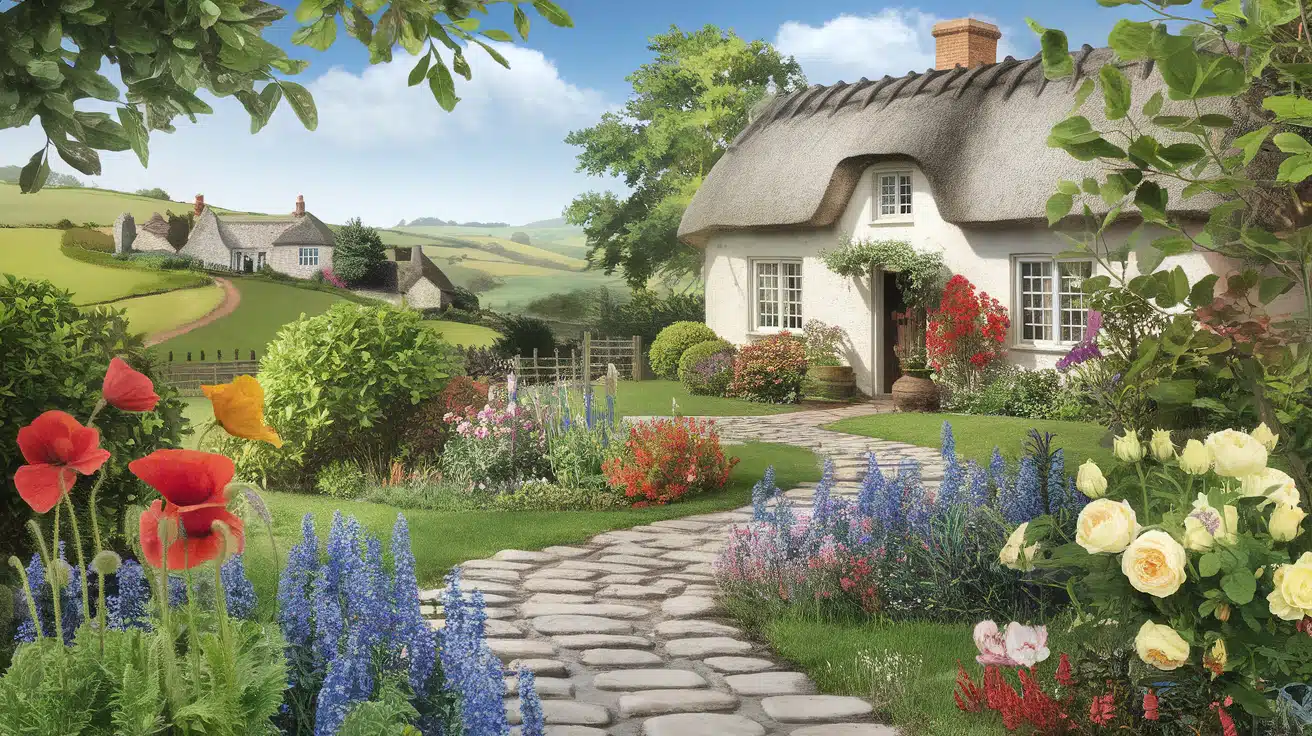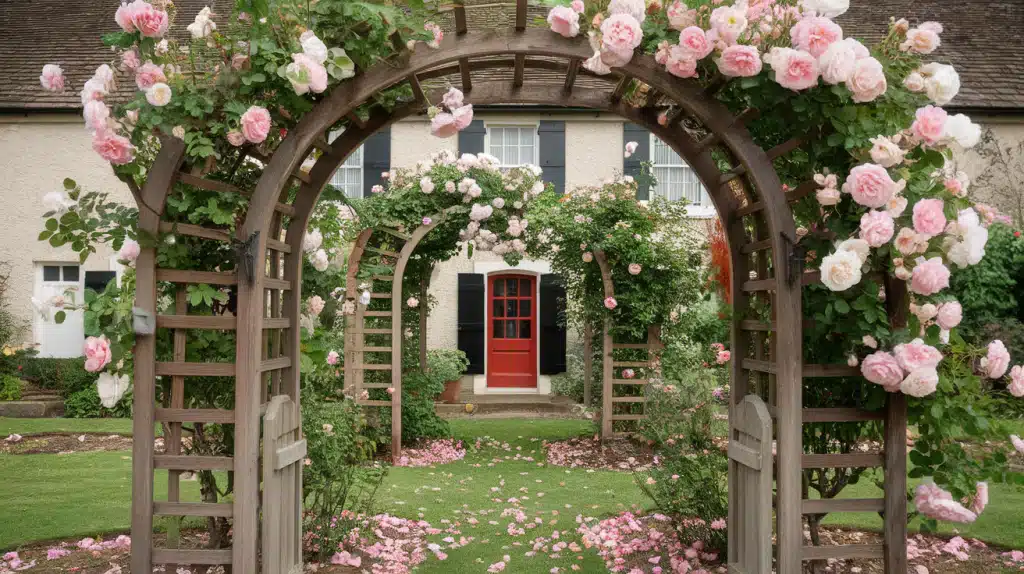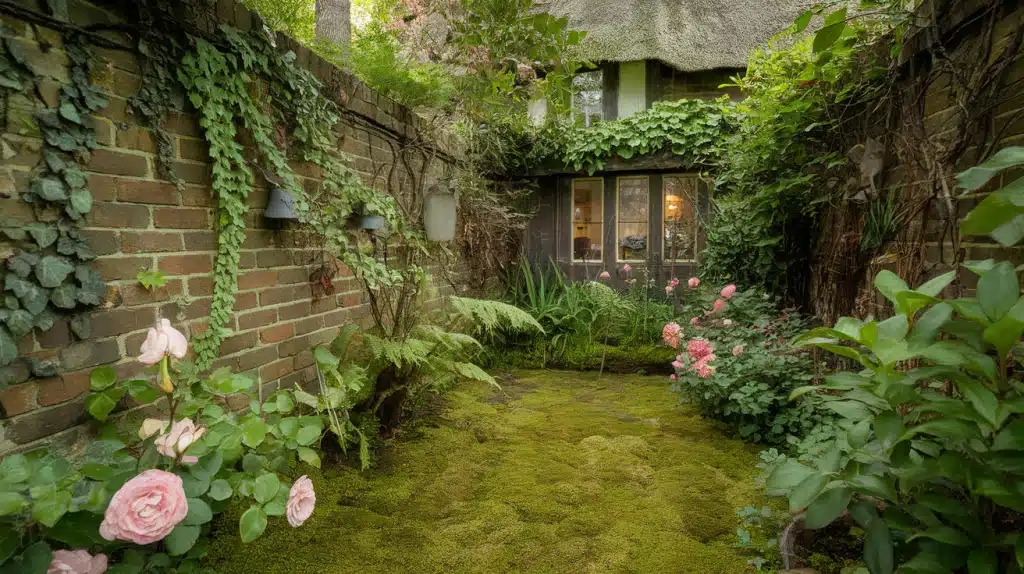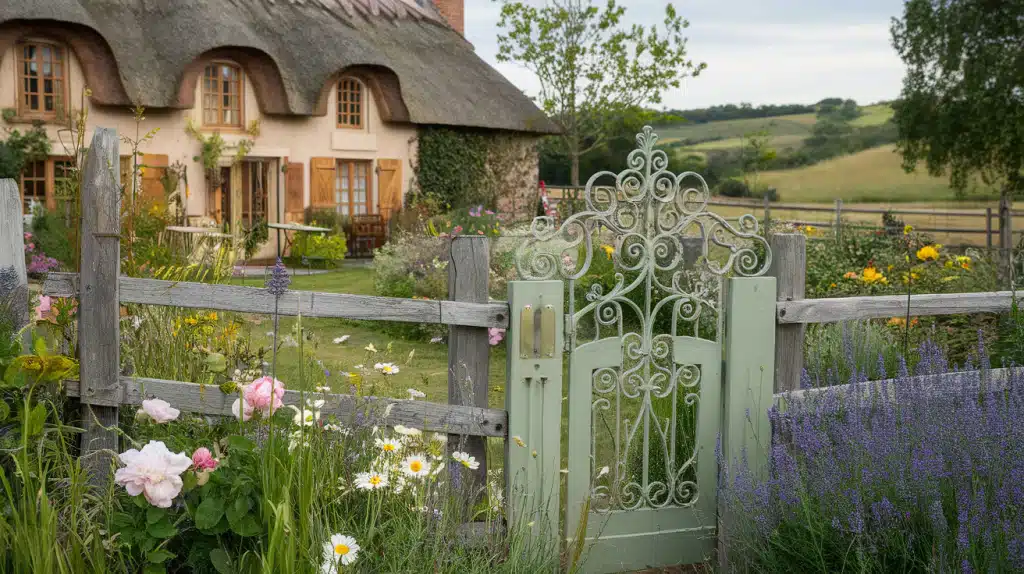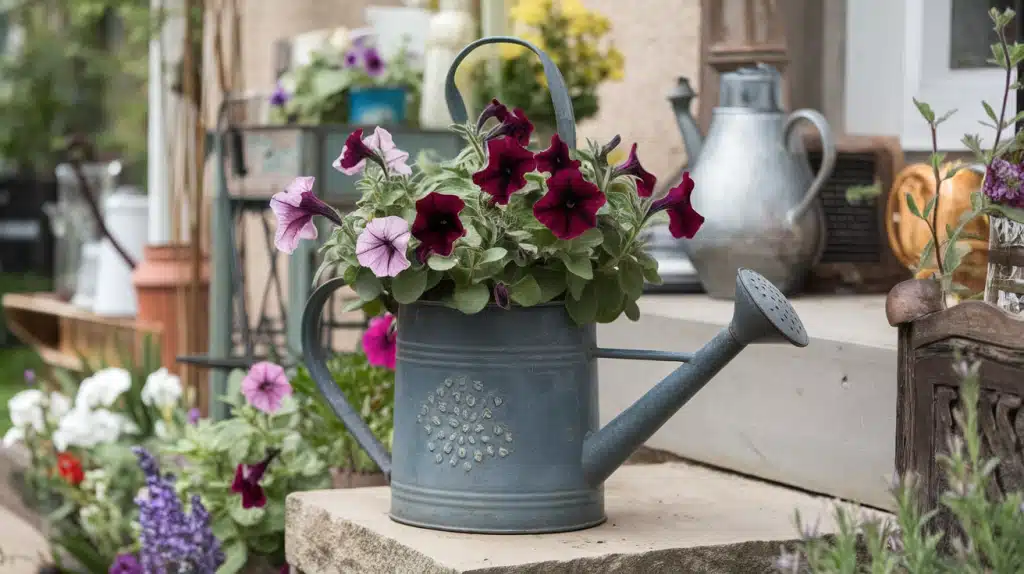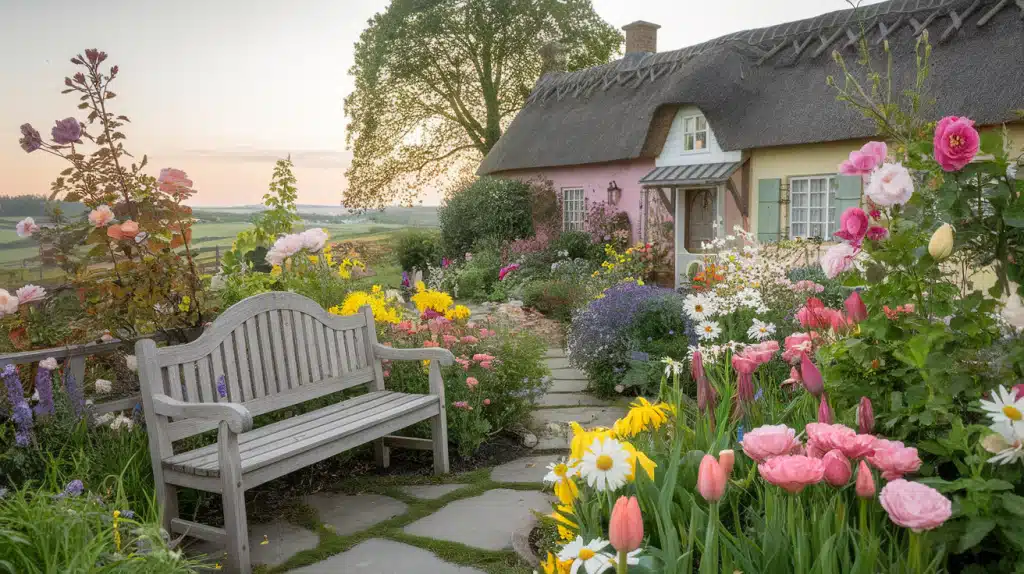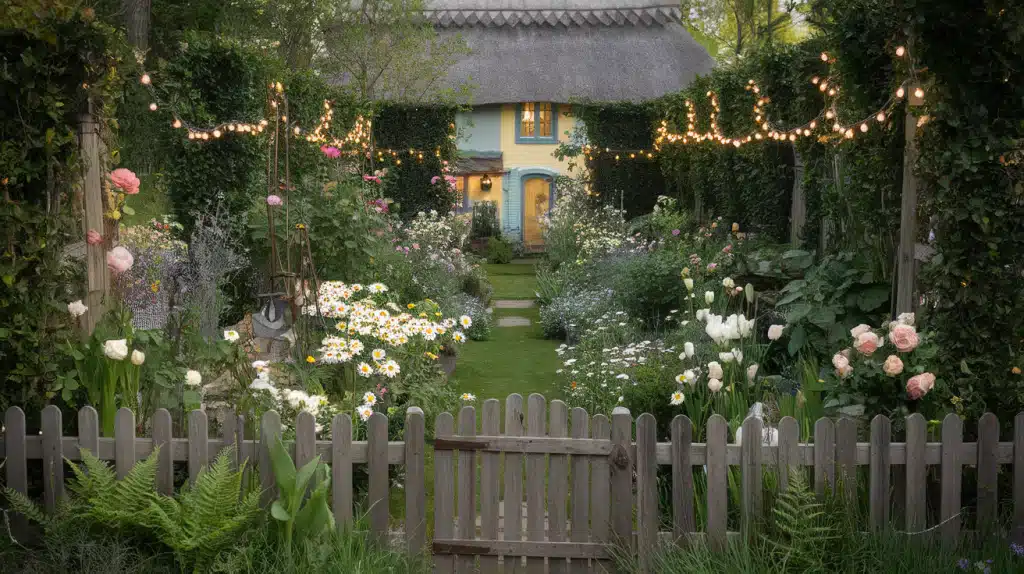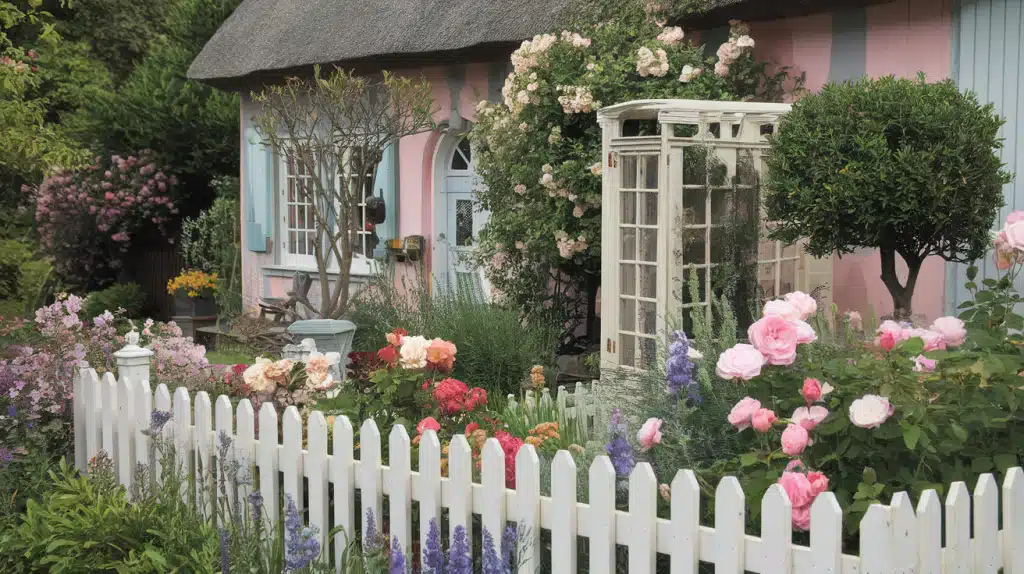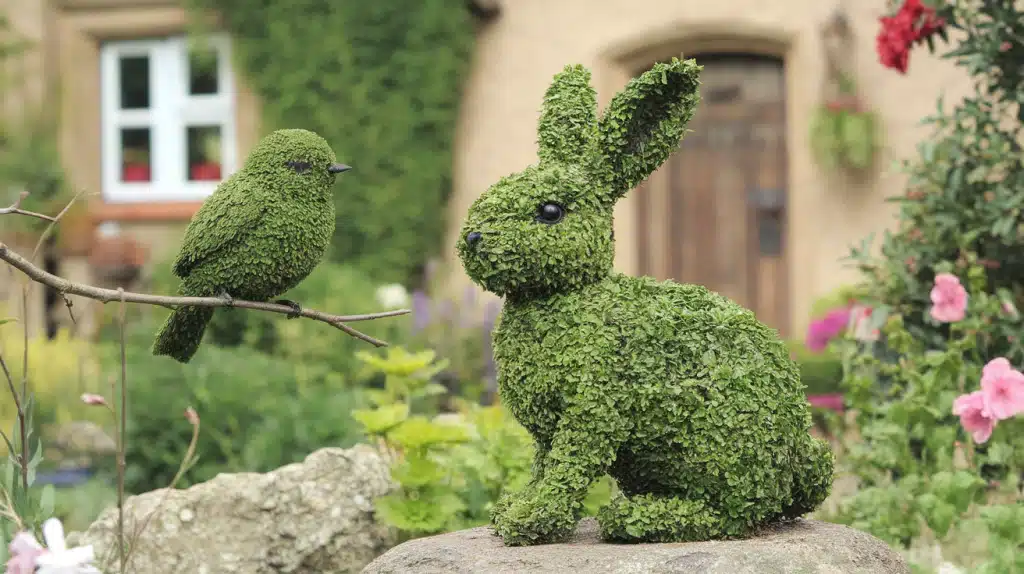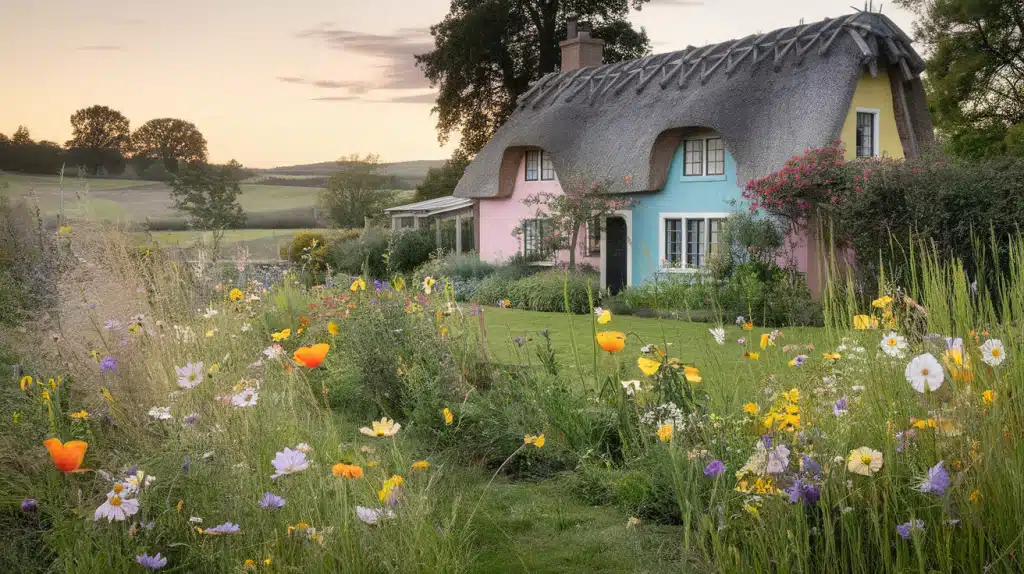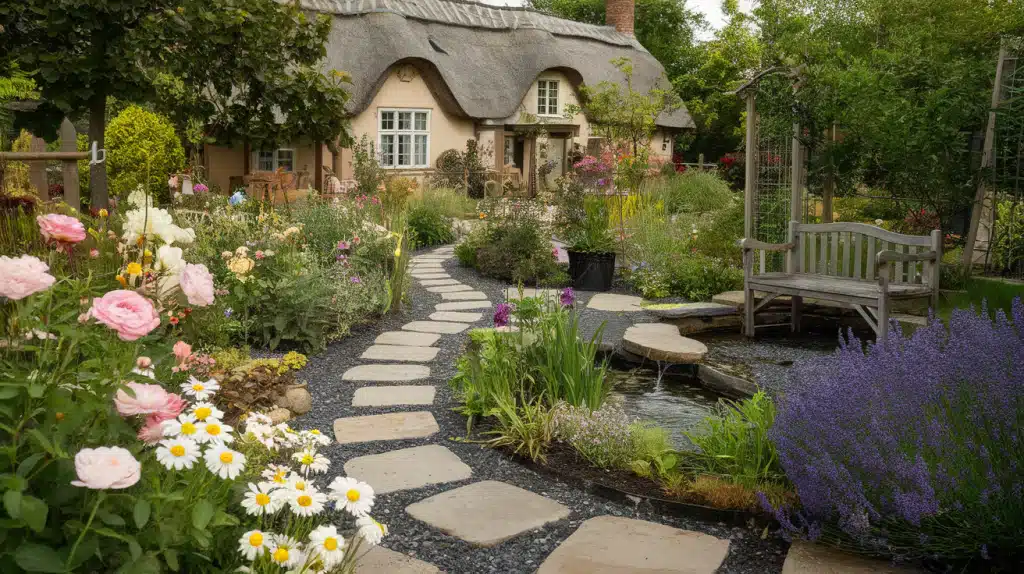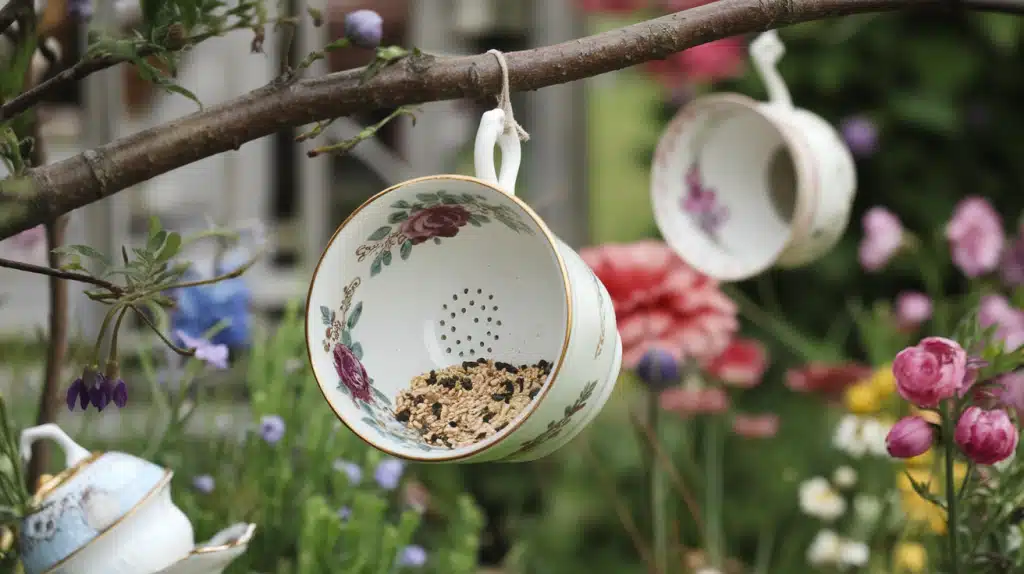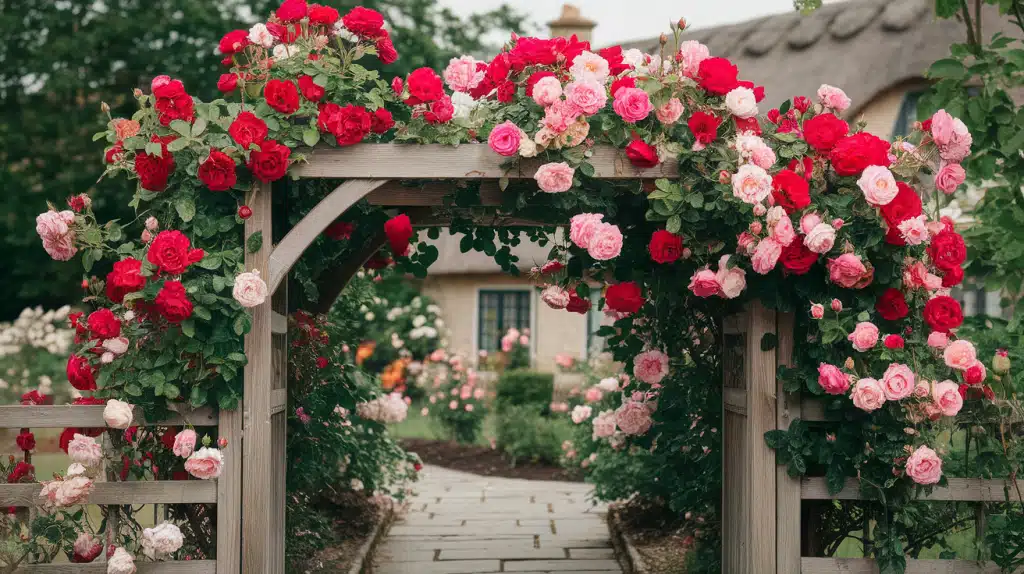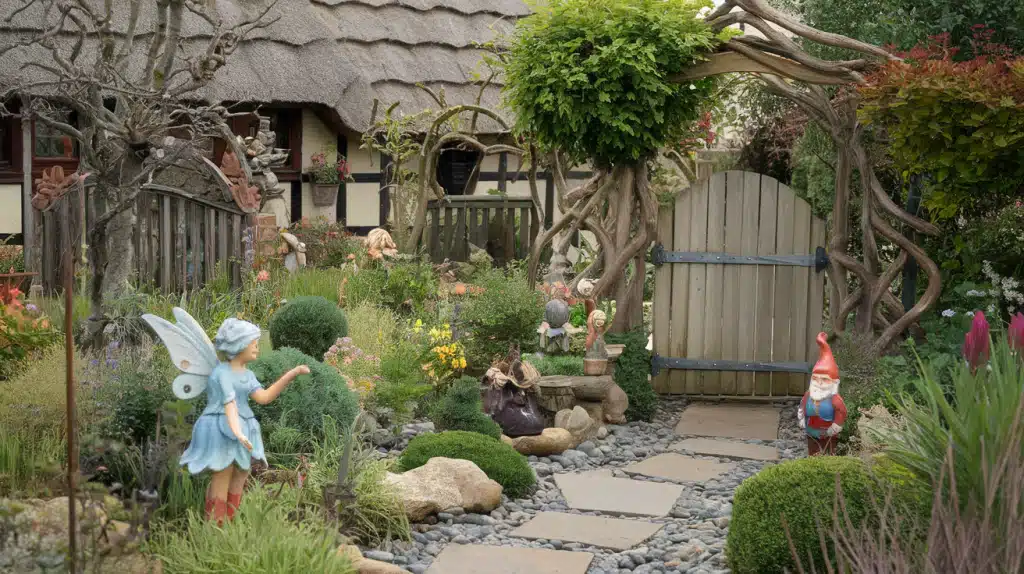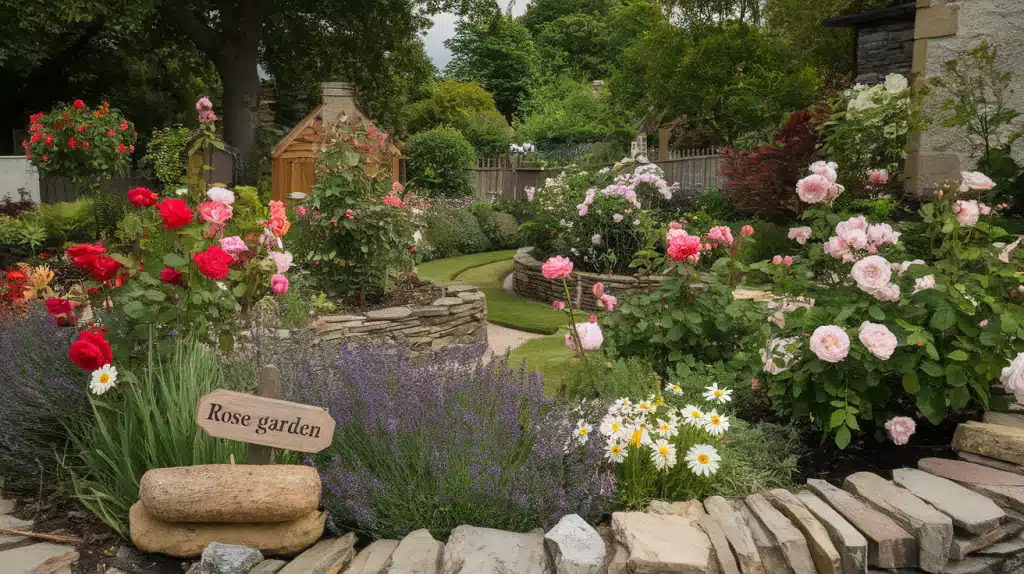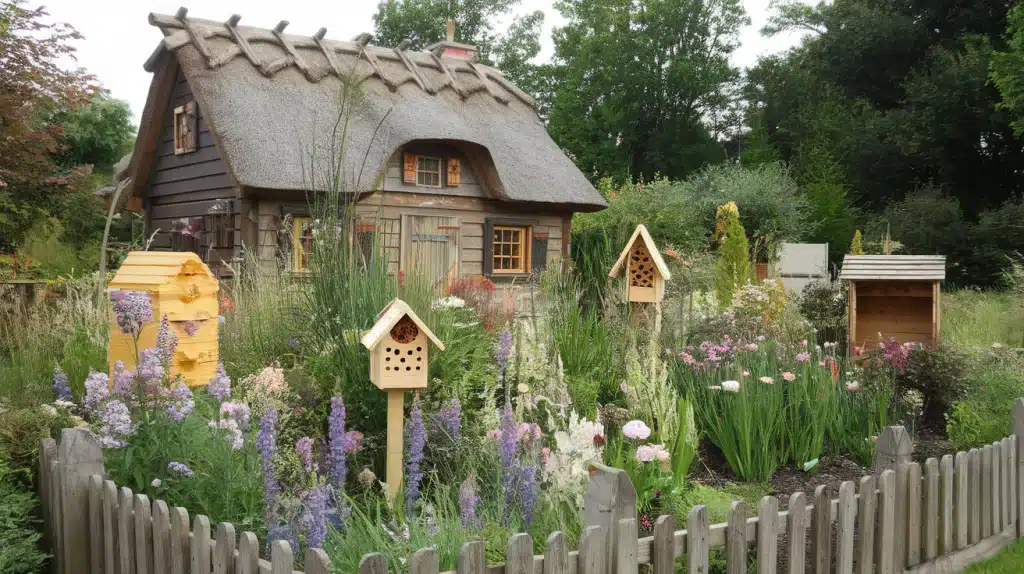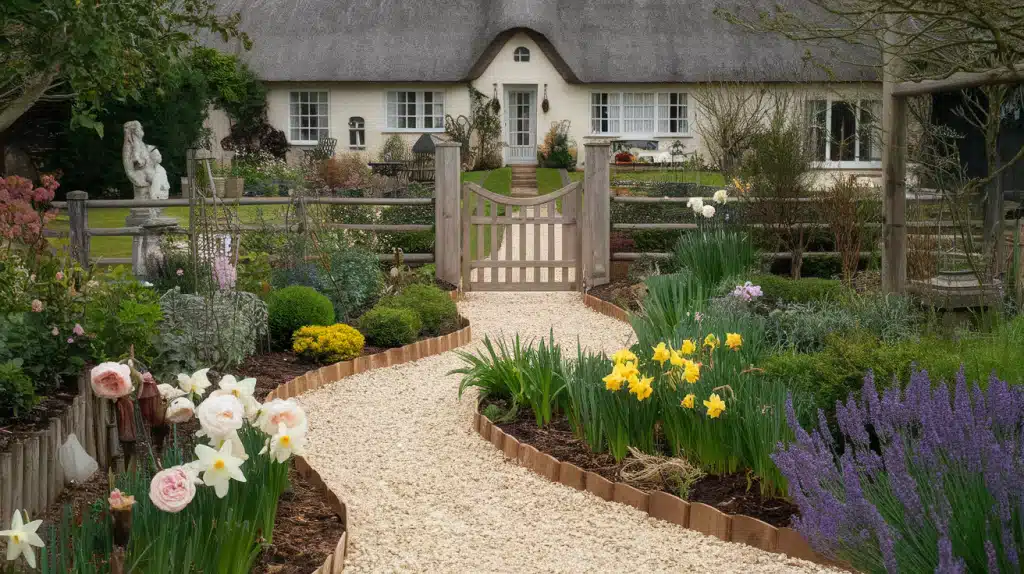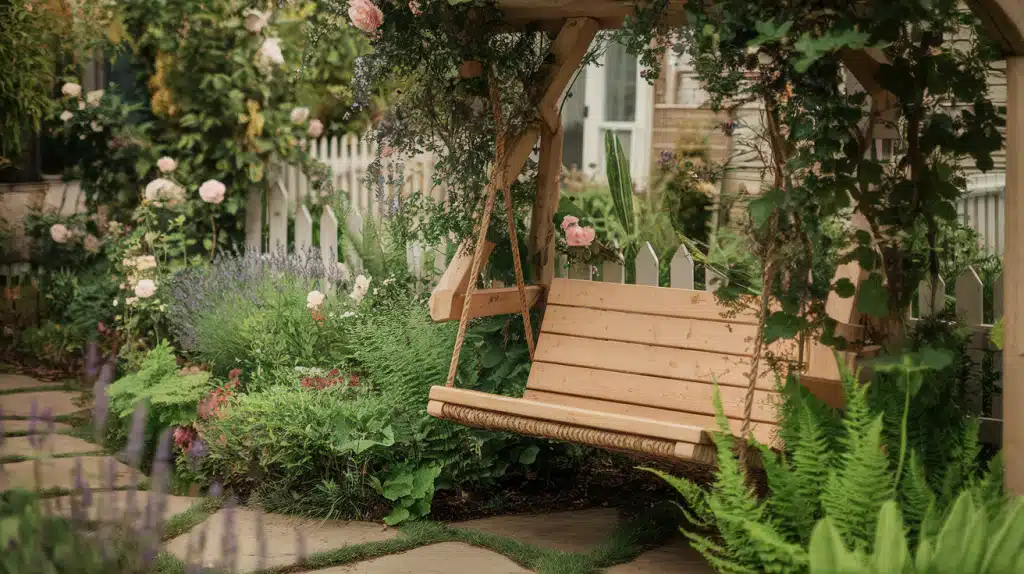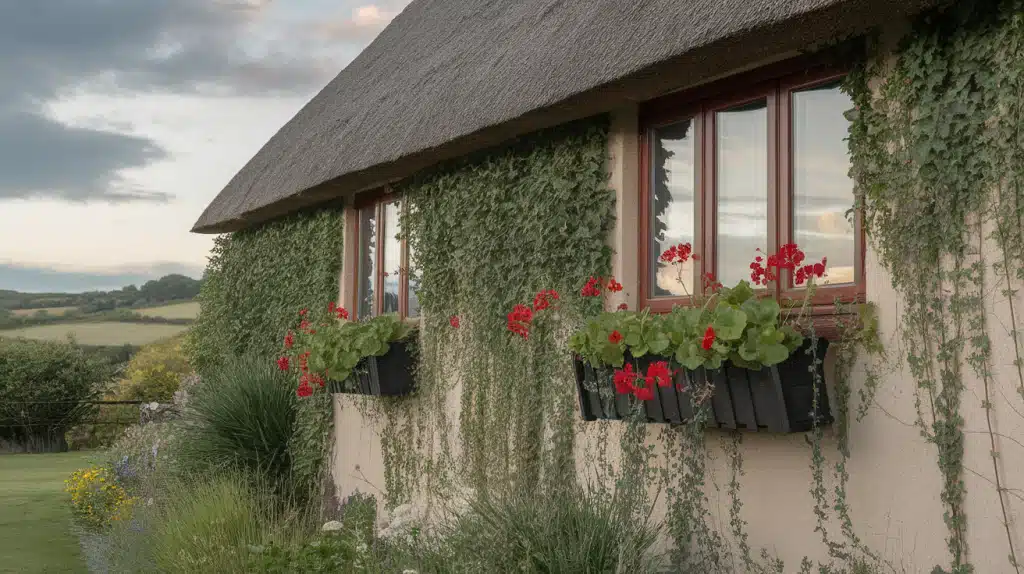Do you dream of a garden that feels like it’s straight out of a beloved children’s storybook?
You’re not alone; thousands of gardeners crave that magical cottage garden charm with overflowing flower beds, winding pathways, and roses climbing over picket fences.
The problem is, most people don’t know where to start creating this enchanted look, or they worry their space is too small for such abundant beauty.
You can transform any outdoor space into a fairytale English cottage garden with the right planning and design ideas.
From choosing the perfect color palette to layering plants for continuous blooms, cottage gardens are surprisingly achievable for beginners. Start small with an English cottage garden corner.
This guide will walk you through specific ideas that bring instant storybook magic to your garden, regardless of your experience level or garden space size. You’ll also find practical gardening tips.
What Defines a Fairytale English Cottage Garden?
A quintessential English cottage garden traces its roots to the humble rural gardens of 16th-century England, where working families cultivated herbs, vegetables, and flowers in cheerful abundance. These early plots shaped the English garden tradition.
These magical spaces are defined by three key design principles: dense plantings that create lush, overflowing beds, rich color combinations that bloom from spring through fall, and informal layouts that feel naturally wild rather than perfectly manicured.
The core elements that give these gardens their storybook charm include meandering pathways that invite exploration, climbing roses that cascade over fences and doorways, vintage accents like old watering cans and weathered benches, and classic white picket fences that frame the romantic scene. They also evoke a secret garden feel.
Unlike formal gardens with rigid rules, cottage gardens celebrate happy chaos where delphiniums mingle with daisies, herbs grow alongside roses, and every corner holds a delightful surprise.
Planning Your Cottage Garden (English Cottage Garden)
- Site preparation and soil care: Clear weeds, add 2-3 inches of compost to the existing soil, and ensure good drainage, as most cottage garden plants thrive in well-draining, fertile ground. For healthy plants.
- Choosing a color palette (soft pastels, rich jewel tones): Select either romantic pastels like pale pink, lavender, and cream for a dreamy feel, or bold jewel tones like deep purple, burgundy, and golden yellow for dramatic impact. Aim for an English cottage garden look.
- Layering: canopy, mid-height, ground cover. Plant tall elements, such as climbing roses and delphiniums, in the back, medium plants like phlox and day lilies in the middle, and low spreaders, like sweet alyssum and creeping thyme, in the front.
- Seasonal planning for continuous bloom: Choose plants that flower at different times, such as spring bulbs, early summer perennials, mid-summer annuals, and fall-blooming asters, to keep color flowing from March through October.
26 Enchanting Fairytale Cottage Garden Ideas
Change your outdoor space into a storybook haven with these magical design elements that capture the charm of traditional English cottage gardens.
1. Winding Stone Pathways
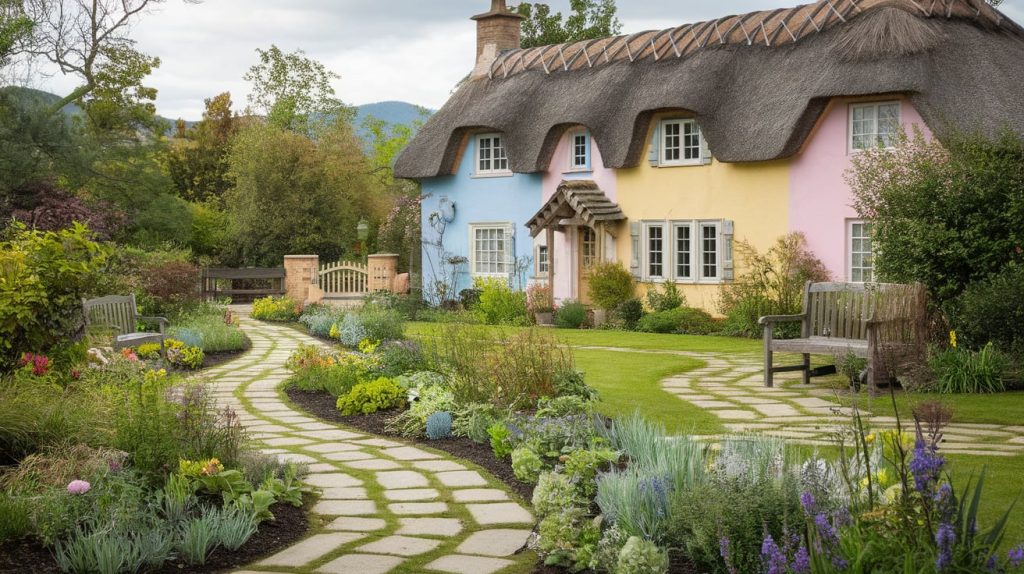
Create mystery and charm by laying natural stone pathways that curve gently through your garden beds. Choose weathered limestone, sandstone, or reclaimed brick for an authentic aged look. These meandering routes invite visitors to slow down and explore each corner of your garden. It makes for an enchanting stroll.
Key Benefits: Creates visual interest, guides foot traffic, adds rustic charm
2. Arched Trellises Covered in Climbing Roses
Install wooden or metal arches at garden entrances or along pathways, then train fragrant climbing roses to cascade over them. David Austin roses, climbing Eden, or classic Lady Banks roses work beautifully. These living doorways create intimate garden rooms and frame stunning views.
Key Benefits: Vertical growing space, fragrant blooms, creates garden rooms
3. Mossy Brick Walls for Secret-Garden Vibes
Build low retaining walls or borders using reclaimed brick, then encourage moss growth by applying buttermilk or yogurt to the mortar joints. These aged-looking walls provide perfect backdrops for climbing plants and create cozy microclimates for shade-loving flowers.
Key Benefits: Adds age and character, supports climbing plants, creates microclimates
4. Antique Iron Garden Gates
Hunt for vintage wrought iron gates at salvage yards or flea markets to create charming entrances. Even if you don’t have a fence, a standalone gate can frame a view or mark the entrance to a special garden area. Paint them in soft sage green or leave them to develop a natural patina.
Key Benefits: Creates focal points, adds architectural interest, and vintage authenticity
5. Foxgloves and Hollyhocks for Vertical Drama
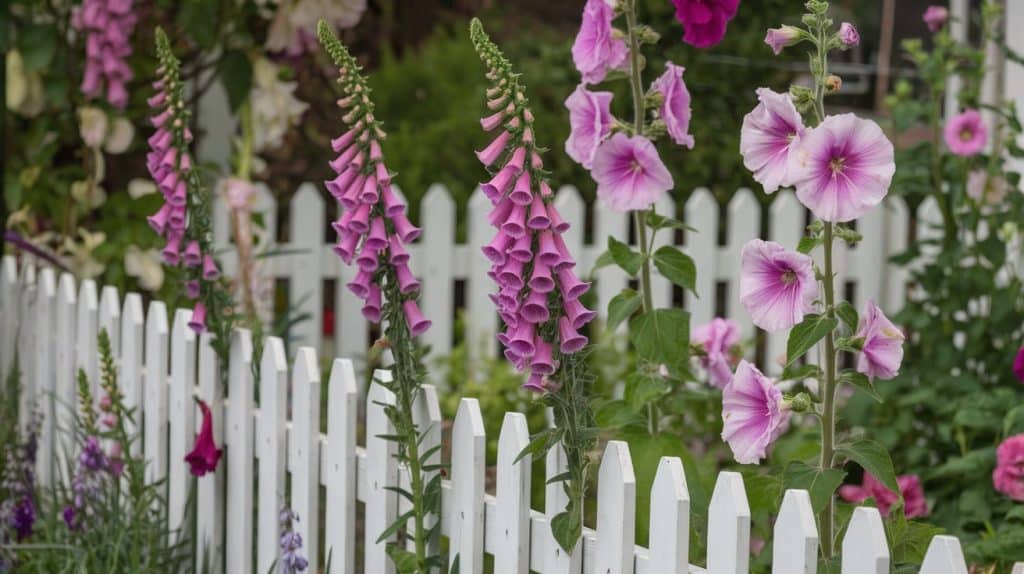
Plant these towering cottage garden classics along walls, fences, or as back-of-border specimens. Foxgloves offer spikes of purple, pink, or white tubular flowers, while hollyhocks provide bold blooms in jewel tones. Both self-seed freely, creating natural drifts that change each year.
Key Benefits: Adds height variation, attracts pollinators, self-seeding naturalness
6. Vintage Watering Cans as Planters
Convert old galvanized or enamel watering cans into charming planters for trailing flowers, such as petunias, verbena, or ivy. Drill drainage holes in the bottom and fill with seasonal blooms. Group different sizes together on steps, benches, or throughout garden beds.
Key Benefits: Repurposes vintage items, adds whimsical charm, portable planting
7. Lavender Borders to Attract Pollinators
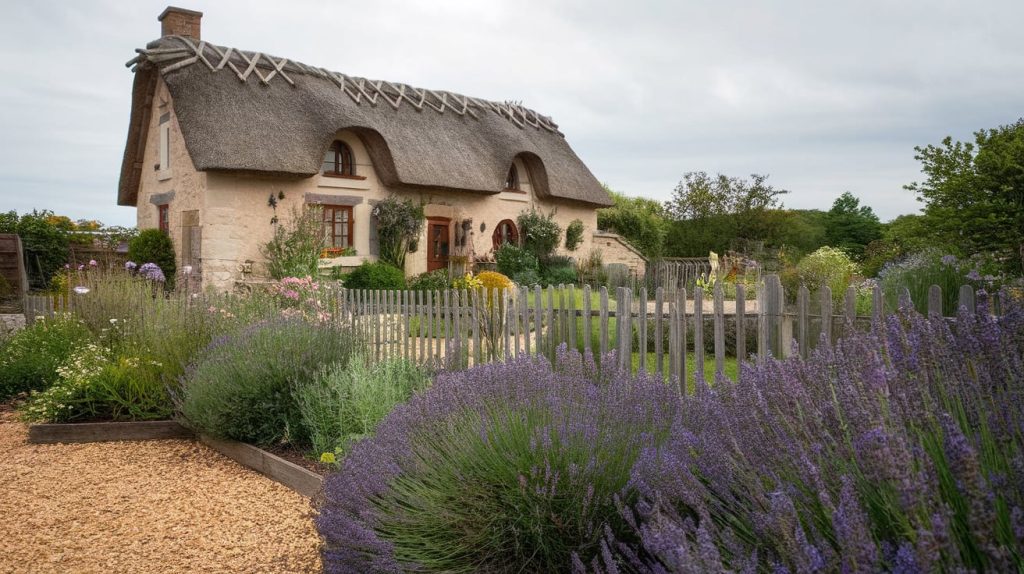
Line pathways or create defined garden edges with fragrant lavender plants. Choose English lavender for cooler climates or French lavender for warmer areas. The silvery foliage and purple flower spikes provide structure while releasing heavenly scents when brushed against.
Key Benefits: Fragrant borders, attracts beneficial insects, multipurpose harvesting
8. Rustic Wooden Benches for Quiet Moments
Position weathered wooden benches in peaceful corners where you can sit and enjoy your garden’s beauty. Look for benches with aged teak, cedar, or painted wood that shows gentle wear. Place them under arbors, beside water features, or facing your most beautiful flower borders.
Key Benefits: Creates seating areas, encourages garden enjoyment, and adds rustic charm
9. Fairy Lights Woven Through Hedgerows
String warm white LED fairy lights through hedges, shrubs, or along fence lines to create magical evening ambiance. Solar-powered options eliminate the need for electrical connections. The soft glow extends your garden’s usability into twilight hours while creating a romantic atmosphere.
Key Benefits: Extends garden enjoyment, creates a romantic ambiance, energy-efficient options
10. A Classic White Picket Fence
Install traditional white picket fencing to define garden boundaries or create internal divisions. The clean lines provide a perfect contrast to the billowing cottage garden plantings, while maintaining the style’s quintessential charm. Train climbing roses, clematis, or sweet peas along the fence for added color and fragrance.
Key Benefits: Defines spaces, classic cottage style, supports climbing plants
11. Miniature Topiary Animals or Shapes
Create whimsical focal points with small topiary forms shaped like rabbits, birds, or simple geometric forms. Use boxwood, rosemary, or lavender for easy-care options. These living sculptures add structure to informal plantings while maintaining a playful, storybook feel. They also introduce a unique focal point.
Key Benefits: Adds structure, whimsical focal points, and develops pruning skills
12. Wildflower Meadows Along the Edges
Establish naturalized areas with native wildflowers at your garden’s perimeter. Scatter seeds of poppies, cornflowers, cosmos, and local native species in spring. These informal areas provide habitat for wildlife while creating soft transitions between cultivated and natural spaces.
Key Benefits: Supports wildlife, low maintenance, natural transitions
13. A Thatched Roof Shed or Greenhouse
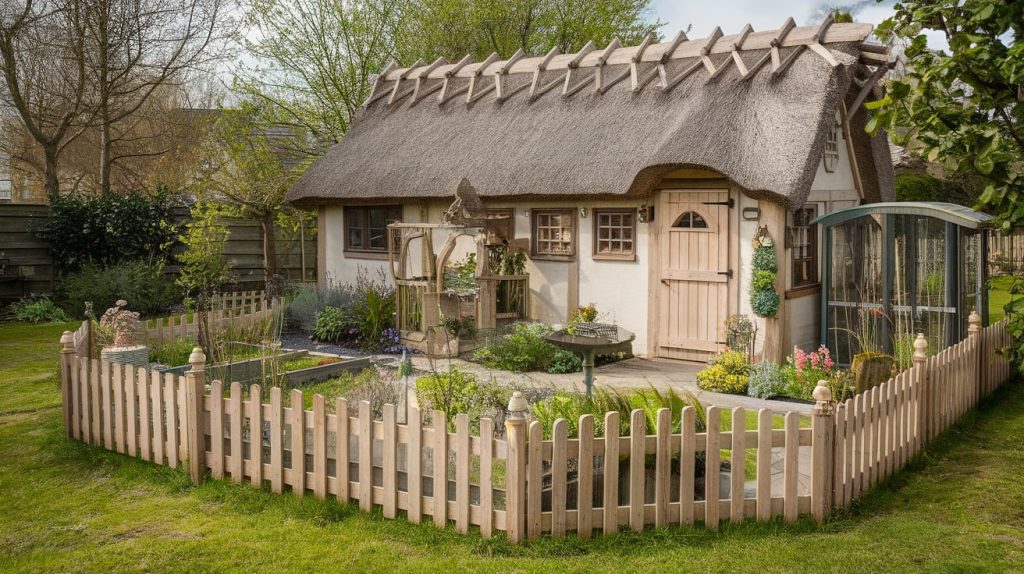
Add authentic English countryside charm with a small thatched-roof outbuilding. Use it for tool storage, potting, or as a cozy retreat. If thatching isn’t possible, consider cedar shingles or corrugated metal with climbing plants for a similar rustic appeal. These structures provide practical storage while serving as beautiful focal points that enhance your garden’s storybook character.
Key Benefits: Practical storage, authentic charm, focal point structure
14. Stepping Stones Leading to Hidden Corners
Create anticipation and mystery with stepping stone paths that lead to secluded garden areas. Use flat, natural stones, concrete pavers, or recycled materials, spaced to ensure comfortable walking. Plant low-growing herbs like thyme or chamomile between stones for fragrance when stepped on.
Key Benefits: Creates mystery, makes spaces feel larger, fragrant walking surface
15. Repurposed Teacups for Bird Feeders
Transform vintage teacups and saucers into charming bird feeders by drilling small drainage holes and hanging them from tree branches. Fill with birdseed, dried berries, or fresh water. These delicate feeders attract small songbirds while adding cottage garden whimsy.
Key Benefits: Attracts wildlife, repurposes vintage items, adds delicate charm
16. A Rose-Covered Arbor Entryway
Build or install a wooden arbor at your garden entrance and train climbing roses to cover it completely. Choose fragrant varieties like ‘New Dawn,’ ‘Eden,’ or ‘Zephirine Drouhin’ for continuous blooms. This living gateway creates a sense of entering another world while providing vertical growing space.
Key Benefits: Creates a grand entrance, maximizes growing space, fragrant welcome
17. Fairy Statues and Garden Gnomes
Place whimsical fairy figurines, garden gnomes, or woodland creatures throughout your garden to add a playful touch of magic. Choose weather-resistant materials like stone, ceramic, or quality resin. Position them peeking out from behind plants or sitting on benches for delightful surprises.
Key Benefits: Adds whimsical elements, appeals to all ages, reinforces fairy tale theme
18. Sun-Drenched Herb Garden Nooks
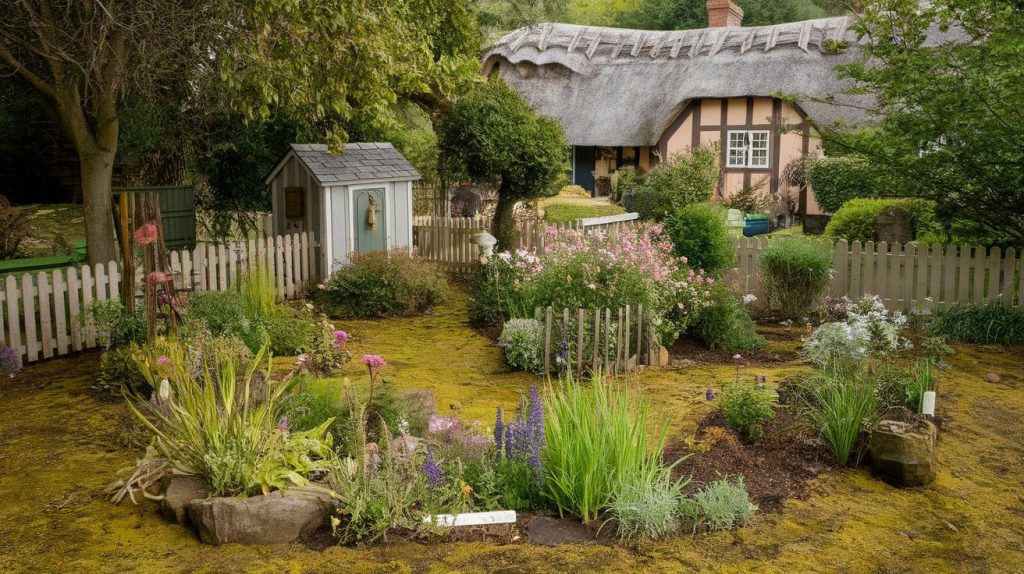
Create dedicated spaces for culinary and medicinal herbs in the sunniest spots of your garden. Group herbs by use or growth habits, combining tall rosemary with trailing oregano and bushy basil. Add vintage herb markers and perhaps a small sundial or herb-drying rack.
Key Benefits: Combines beauty with function, provides fresh herbs, and educational opportunities
19. A Bubbling Stone Fountain or Birdbath
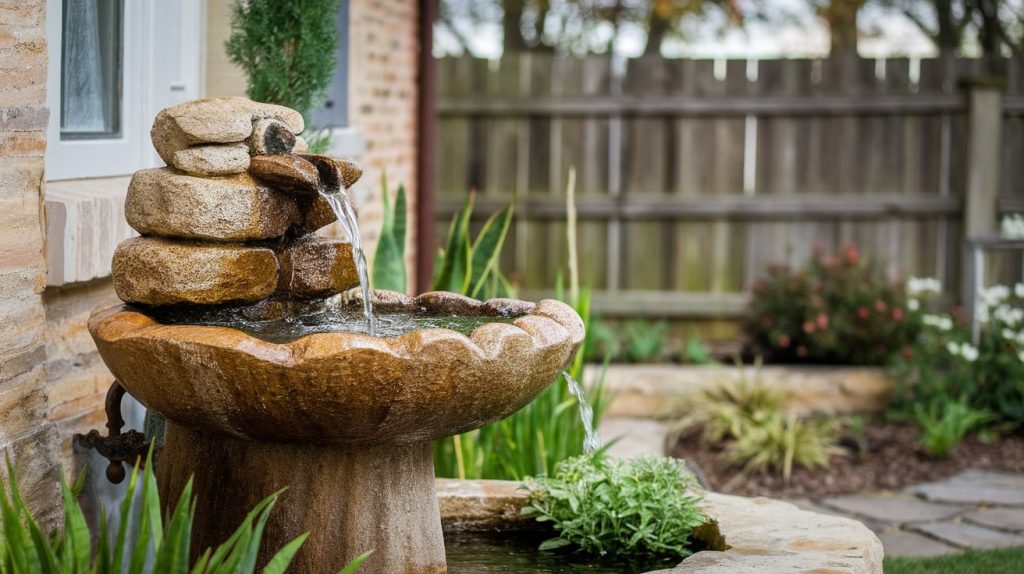
Install a small water feature to add soothing sounds and attract birds and beneficial insects. Choose natural stone materials that complement your garden’s rustic style. Position it where you can enjoy the sound from seating areas while ensuring it’s visible from windows.
Key Benefits: Attracts wildlife, creates peaceful sounds, prevents mosquito breeding
20. Hand-Painted Wooden Signs for Plant Labels
Create custom plant markers using reclaimed wood and weather-resistant paint. Write plant names in charming script or print letters for a personal touch. These handmade labels add character while helping you remember plant names and locations.
Key Benefits: Personal touch, helps plant identification, seasonal flexibility
21. Wicker Baskets Overflowing with Blooms
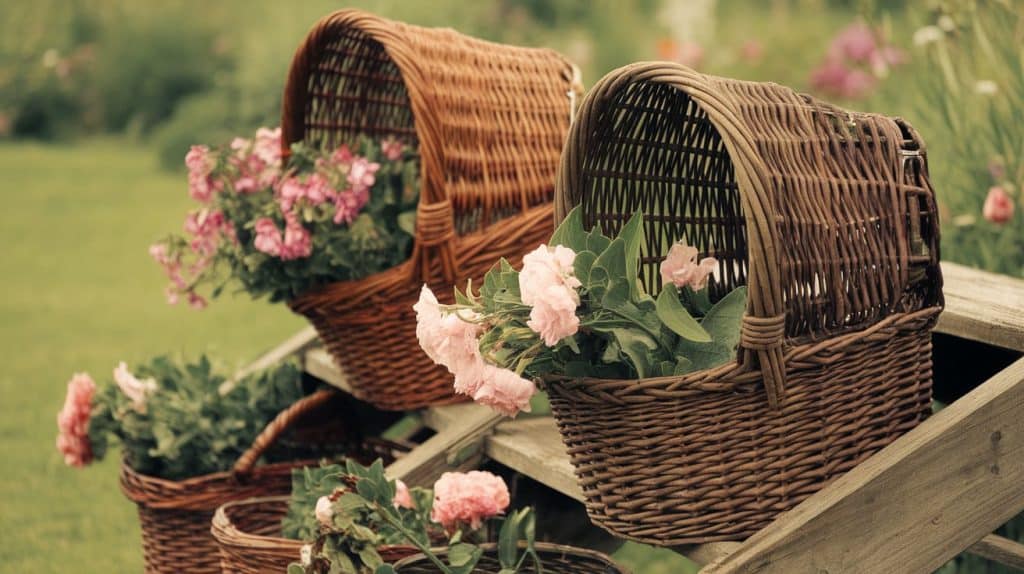
Use vintage wicker baskets as portable planters filled with seasonal flowers. Line them with plastic or coir liners for drainage, then plant with cascading flowers like petunias, bacopa, or trailing verbena. Move these living arrangements around your garden for flexible color placement, or use them to brighten patios and entrances with instant cottage garden charm.
Key Benefits: Portable color, flexible arrangements, instant cottage charm
22. Bee Hotels or Butterfly Houses
Support beneficial insects by installing purpose-built homes for solitary bees and butterflies. Select natural wood construction with bamboo tubes or drilled holes for your bee hotel. Butterfly houses provide shelter during bad weather and overwintering sites.
Key Benefits: Supports beneficial insects, educational value, enhances pollination
23. Layered Flower Borders with Cottage Staples
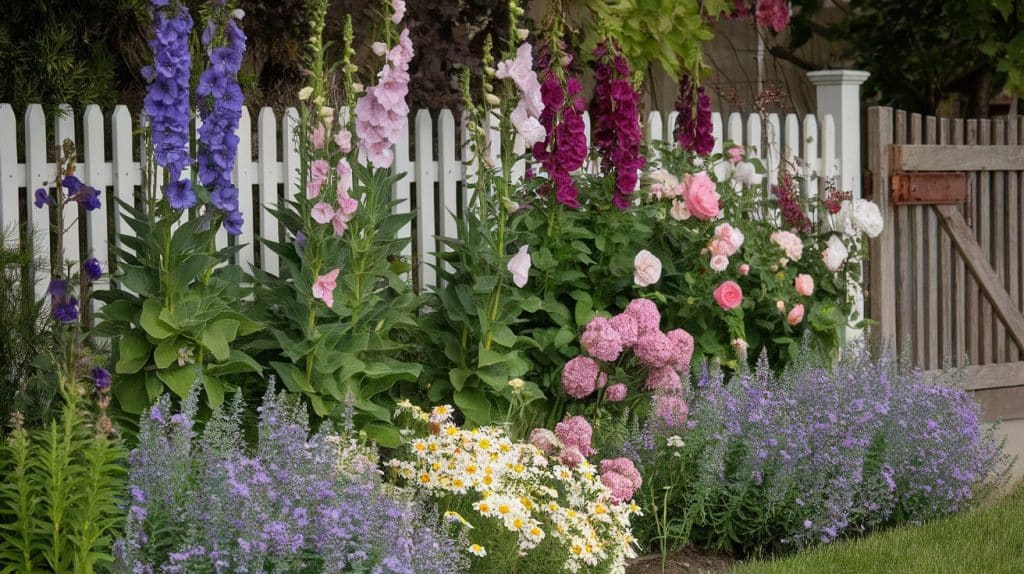
Create depth and continuous color with traditional cottage garden flowers arranged by height. Plant tall delphiniums and hollyhocks in back, medium-height phlox and roses in the middle, and low-growing daisies and sweet alyssum in front. This arrangement highlights the plants textures.
Key Benefits: Continuous blooms, classic arrangement, abundant cottage look
24. Soft Gravel or Bark Paths with Curves
Design gentle, curving pathways using natural materials like pea gravel, crushed shell, or bark chips. These soft surfaces feel comfortable underfoot while allowing water to drain naturally. Edge the paths with plants or natural stones to prevent spreading. The organic curves create a relaxed, informal feeling that perfectly complements cottage garden plantings.
Key Benefits: Natural drainage, comfortable walking, informal organic feel
25. A Hidden Reading Nook or Swing Seat
Create a secret retreat with a comfortable seat tucked away in a quiet corner of your garden. Use a wooden swing, cushioned bench, or even a hammock surrounded by fragrant plants. Add a small side table for books and tea, and perhaps a weatherproof basket for gardening gloves.
Key Benefits: Creates a private retreat, encourages relaxation, and personal garden enjoyment
26. Window Boxes Bursting with Geraniums and Ivy
Install flower boxes under windows or along fence tops, then fill them with classic combinations like red geraniums and trailing ivy. Add seasonal accents, such as white alyssum or colorful petunias, for variety. These elevated planters bring cottage garden charm to eye level while softening hard architectural lines.
Key Benefits: Eye-level color, softens architecture, classic cottage combinations
Conclusion
Creating your own fairytale English cottage garden is one of the most rewarding ways to change your outdoor space into a magical retreat.
From winding stone pathways and rose-covered arbors to whimsical fairy lights and vintage watering can planters, these ideas give you everything needed to craft a garden that feels like stepping into a beloved storybook.
Why does this matter? Your garden should be a place that brings joy every time you step outside. A cottage garden fosters a special connection between you and nature, providing a peaceful escape from daily stress.
The informal, welcoming style encourages you to spend more time outdoors, whether you’re tending plants, reading in a hidden nook, or simply enjoying the fragrance of lavender and roses.
Ready to start your cottage garden conversion? Begin with just one or two ideas that speak to you most, perhaps a small herb garden nook or some fairy lights in your existing plants.
Let us know in the comments which cottage garden idea you’re most excited to try first!

